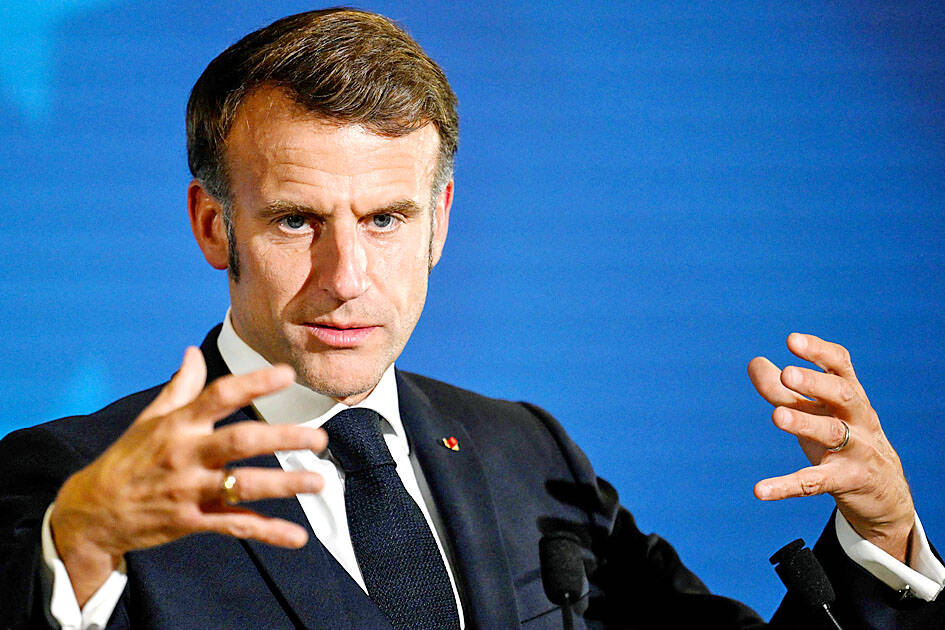French President Emmanuel Macron told EU leaders to consider using the bloc’s most powerful trade tool against China if they are not able to find a resolution to Beijing’s planned export controls on critical rare earths.
Macron said they need to weigh using all options available against China, including the EU’s so-called anti-coercion instrument (ACI), people familiar with the matter said.
He made the statement to his counterparts during a leaders’ summit in Brussels on Thursday, the people said.

Photo: AFP
“This is economic coercion,” Macron told reporters after the summit, referring to the Chinese announcement on rare earths, without commenting on the specifics of the closed-door conversation.
“We can see the impact it is having on us and we need to be able to respond,” he said.
China announced plans to significantly tighten controls on its exports of rare earths and other critical materials earlier this month. Under the measures, overseas exporters of items that use even traces of certain rare earths sourced from China would need an export license.
The export restrictions would pose a massive threat to Europe’s industry and security, as the inputs are critical across sectors and used in everything from electric vehicle batteries to defense manufacturing.
Following the summit, German Chancellor Friedrich Merz confirmed that the ACI was discussed, but that no decision had been reached on using it. He said it was now up to the European Commission, which handles trade matters for the EU, to decide whether to deploy the ACI.
The ACI, which has never been used, was designed primarily as a deterrent, and if needed, to respond to deliberate coercive actions from third countries that use trade measures as a means to pressure the policy choices of the EU or its members.
Those measures could include tariffs, new taxes on technology companies or targeted curbs on investments in the EU. They could also involve limiting access to certain parts of the EU market or restricting Chinese firms from bidding for public contracts in Europe.
The instrument was created as part of the EU’s effort to boost its trade defenses after the US imposed tariffs on the bloc’s exports during the US President Donald Trump’s first administration.
Another factor was China’s decision to place restrictions on Lithuanian goods after Taiwan opened a trade office in the nation.
Use of the EU’s most potent trade tool is unlikely at this stage as it would significantly escalate tensions with China. France has called for using the instrument before, including during trade talks with the US, but the drive never fully gained traction.
The European Commission is working on options that it could use if a diplomatic solution with China is not found. It is preparing a list of trade measures by the end of the month that can later be deployed against China to boost its negotiating leverage on the issue, Bloomberg reported earlier.

France cannot afford to ignore the third credit-rating reduction in less than a year, French Minister of Finance Roland Lescure said. “Three agencies have downgraded us and we can’t ignore this cloud,” he told Franceinfo on Saturday, speaking just hours after S&P lowered his country’s credit rating to “A+” from “AA-” in an unscheduled move. “Fundamentally, it’s an additional cloud to a weather forecast that was already pretty gray. It’s a call for lucidity and responsibility,” he said, adding that this is “a call to be serious.” The credit assessor’s move means France has lost its double-A rating at two of the

Jensen Huang (黃仁勳), founder and CEO of US-based artificial intelligence chip designer Nvidia Corp and Taiwan Semiconductor Manufacturing Co (TSMC, 台積電) on Friday celebrated the first Nvidia Blackwell wafer produced on US soil. Huang visited TSMC’s advanced wafer fab in the US state of Arizona and joined the Taiwanese chipmaker’s executives to witness the efforts to “build the infrastructure that powers the world’s AI factories, right here in America,” Nvidia said in a statement. At the event, Huang joined Y.L. Wang (王英郎), vice president of operations at TSMC, in signing their names on the Blackwell wafer to

AI BOOST: Although Taiwan’s reliance on Chinese rare earth elements is limited, it could face indirect impacts from supply issues and price volatility, an economist said DBS Bank Ltd (星展銀行) has sharply raised its forecast for Taiwan’s economic growth this year to 5.6 percent, citing stronger-than-expected exports and investment linked to artificial intelligence (AI), as it said that the current momentum could peak soon. The acceleration of the global AI race has fueled a surge in Taiwan’s AI-related capital spending and exports of information and communications technology (ICT) products, which have been key drivers of growth this year. “We have revised our GDP forecast for Taiwan upward to 5.6 percent from 4 percent, an upgrade that mainly reflects stronger-than-expected AI-related exports and investment in the third

RARE EARTHS: The call between the US Treasury Secretary and his Chinese counterpart came as Washington sought to rally G7 partners in response to China’s export controls China and the US on Saturday agreed to conduct another round of trade negotiations in the coming week, as the world’s two biggest economies seek to avoid another damaging tit-for-tat tariff battle. Beijing last week announced sweeping controls on the critical rare earths industry, prompting US President Donald Trump to threaten 100 percent tariffs on imports from China in retaliation. Trump had also threatened to cancel his expected meeting with Chinese President Xi Jinping (習近平) in South Korea later this month on the sidelines of the APEC summit. In the latest indication of efforts to resolve their dispute, Chinese state media reported that